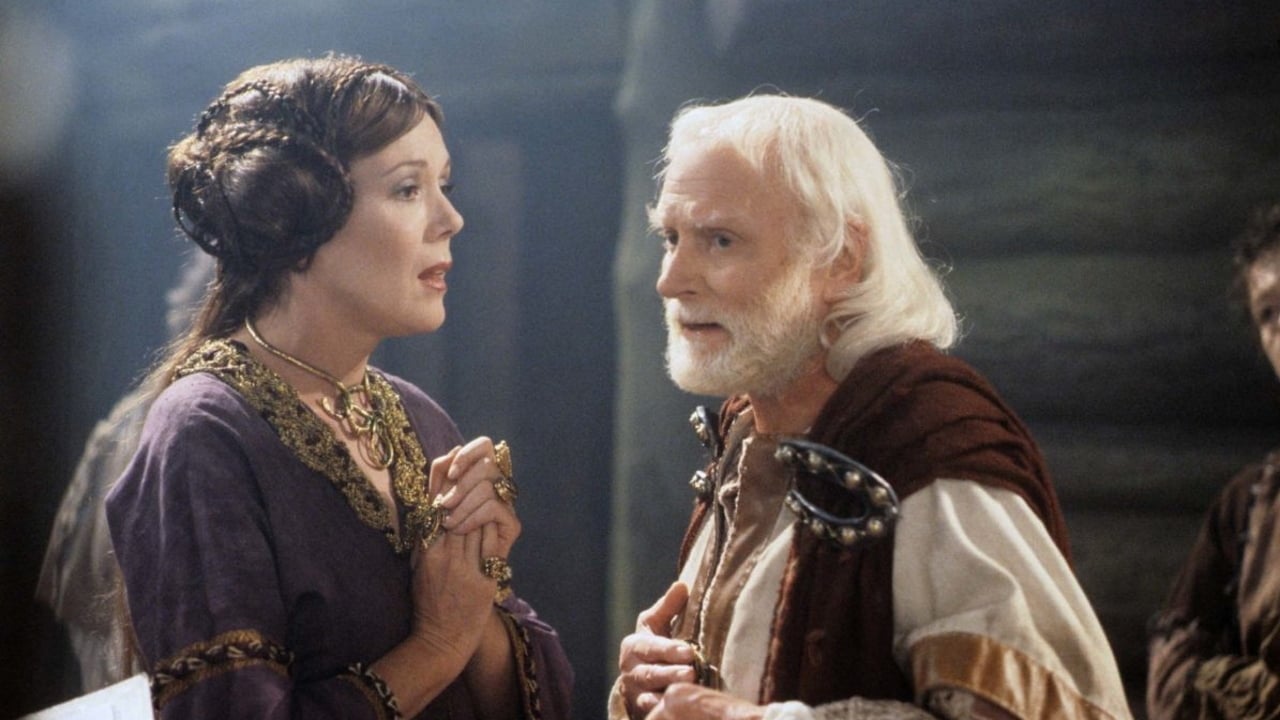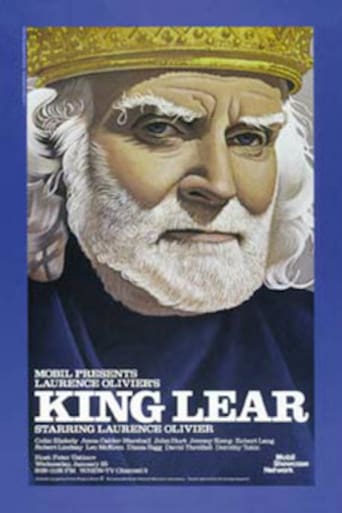Plantiana
Yawn. Poorly Filmed Snooze Fest.
Linbeymusol
Wonderful character development!
GurlyIamBeach
Instant Favorite.
Paynbob
It’s fine. It's literally the definition of a fine movie. You’ve seen it before, you know every beat and outcome before the characters even do. Only question is how much escapism you’re looking for.
alan-1029
King Lear is a rough-hewn, majestic work of genius which addresses issues of life and family that we can all identify with, 400 years later. It is a difficult play to get right, on screen or on the stage because it demands the greatest acting from the best available actors.And this gripping performance manages to do it. The sets are cheap, the video quality is poor and murky but the powerful work of a terrific Laurence Olivier and a faultless cast of Britain's finest Shakespearean actors shines through. One poor performance can ruin a production like this, but every single actor rises to the occasion, and each character is well-realised and credible. There is not a single weak performance, even from those with the smallest roles. The poetry flows, the imagery is beautiful and moving and the themes are brought into sharp relief. From the first scene, you will not need a text of the play to understand what is going on.With Olivier gone and Branagh still several decades from being old enough to take on the role, we can expect this to be the definitive version for years to come.
Dan1863Sickles
An all-star cast takes on Shakespeare's greatest tragedy. Laurence Olivier is Lear -- once a mighty king, now a weak, jealous old man. Tired and in need of rest, he divides his kingdom among his three daughters. Cordelia, the youngest, is good and kind, while Regan and Goneril are wicked schemers who soon turn against the king and try to murder him! Lear has loyal friends, like Kent the noble, and his jester, the Fool. Colin Blakely makes Kent into the perfect, rugged sidekick, as brave and reliable as Sam in LORD OF THE RINGS. And John Hurt makes the haunting, half-crazed fool as helpless and pitiable as Gollum, without all the creepy sliminess.But the real stars of the play are actually the villains. Diana Rigg is delicious as Regan, the younger of the two "wicked sisters." Even when she is shiveringly evil, (joking about Gloucester's pain as she pokes out his eyes!) she remains a stunningly desirable woman. And the twisted affair between Regan and the studly but wicked Edmund is much more erotic and involving than in most productions. Robert Lindsay captures the gigolo side of Edmund perfectly, always teasing and tempting and making poor love-struck Regan literally pucker up to kiss the empty air. Diana Rigg really plays all sides of the character -- watching her pout and sulk in her tent would be sweetly endearing if she weren't so truly and completely cruel. As a result the viewer is spellbound, unable to resist the evil but horrified by the inevitable tragedy.With an all-star cast, original scenery and a haunting musical score, this bold production is Shakespeare at the summit!
Robert J. Maxwell
Here is Olivier in his 70s, a guy who simply could not stop working. In his last years, visibly old, his face fallen, disabled by disease, he still kept calling his agent and asking, "Can't I work"? I'm going to cut the guy some slack. I mean -- the very fact that he was able to PICK UP Cordelia and carry her at his age was no mean feat! And I didn't catch any gross weaknesses in his performance. Or in anyone else's for that matter. Diana Rigg could turn anybody into an ice cube just by looking at him or her. I loved John Hurt's Fool, especially, and the relationship between him and Lear, the latter amused by the former's insults, even while warning him that he may go too far. John Hurt was my supporting player in a courtroom movie in which I was the sketch artist, "From the Hip," a story far superior to anything Shakespeare ever wrote. All seriousness aside, as for "Lear" the play, I just don't know. The plot of full of holes and unpleasantnesses. Basically the engine behind the story is that Goneril and Regan brown nose the King, while Cordelia says with blunt honesty that she loves him as much as her bond to him demands, no more and no less. "Nothing will come of nothing," and so forth, says Lear, understandably confused because she's not following the usual interactional grammar. Well, all Cordelia has to do is say something like, "Wait a minute. I really do love you. It's just that I'm not going to throw myself at your feet to get a piece of your property. My love means more than that." But no. Tragedy builds upon tragedy. And it's LEAR who is ordinarily blamed for this misunderstanding! Well, that's a patriarchal society for you. And, pardon, but what happened to The Fool? He disappears without explanation halfway through the play! What happened? Did WS lose a few pages of the play and then forget about them? And that eye-gouging business -- discomfiting. And at the end, with Lear moaning over the dead Cordelia, he comes up with something like, "And my poor fool is hanged". What's that all about? Was Cordelia a fool? Was he referring to "The" Fool, who was hanged somewhere in the missing pages of the ms.? Lear winds up in a gale on the moor, running around naked, and afterward decorating his hair with posies like some berserk Mellors. Does he deserve this because he didn't catch Cordelia's covert meaning? Why should misfortune after misfortune be heaped upon Lear? Isn't being very old enough of a tragedy, all by itself, for Lear? Or for Olivier? For anybody?
dh49
I got lost through the first half of Olivier's Richard III. But his Lear some twenty years later sucked me in by absolute force. It may have been a bit difficult for me to ever have seen his King Lear storming across the battlefield, his sentimental age was disarming and effective. Particularly in the first scene with his dividing of the kingdom. He and Cordelia shared some intensely effective moments. His final moments are also moving and quite worthwhile. He gets a bit lost in the melodramatics of the middle, and more whines and rants "Reason not the need" than may have been necessary, but on the whole his performance shows the craft of his decades as a respected Shakespearean performer. The supporting cast is also very strong with all the daughters with the possible exception of Cordelia coming off very well. Hurt seems a bit jumbled as the fool, but that may have been the idea, and the parting shot of him tries to answer the old question of what happens to the fool after he fades out of the text. Edmund and Edgar could really be brothers, and work well in opposing roles. Both actors seem to love to show off their teeth through bushy beards, but despite moments of scenery chewing, they get the job done well. Leo McKern shines out of the supporting cast as Glouster. He is by turns jovial, tormented, lost, pained and thoughtful. An excellent interpretation of that role makes the work engaging for the stretch of time when Lear is taking his "forth act break". The sets and music may be a little crude, but the idea was that the acting be the focus, and fortunately it is. Very very nice and effective theatrical work.

